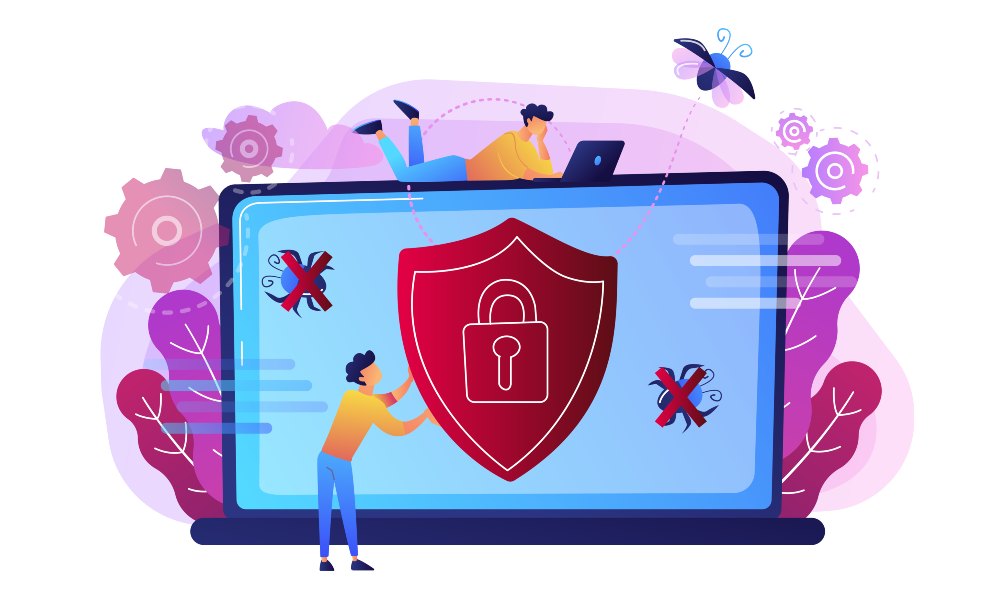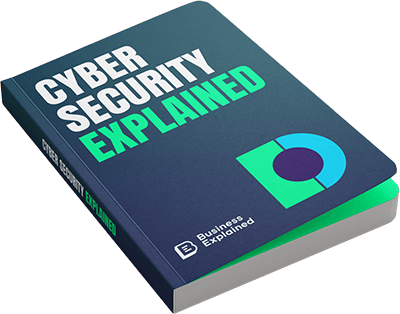Table of Contents
- #1 Phishing Attacks
- #2 Ransomware Attacks
- #3 Insider Threats
- #4 Weak Passwords
- #5 Unpatched Software
- #6 Social Engineering Attacks
- #7 Distributed Denial of Service (DDoS) Attacks
- #8 Malware Attacks
- #9 Business Email Compromise (BEC)
- #10 Third-Party Vendor Risks
- Why Are Small Businesses Usually the Target of Hackers?
- What Can Be the Reason for The Attack?
- How Do You Assess Your Business Security Using Cybersecurity Best Practices?
Cybersecurity has become one of the most pressing concerns for small businesses, as more companies migrate their operations online. Unlike large corporations, small businesses often lack the resources to implement sophisticated security protocols, making them prime targets for cybercriminals.
The threats they face are evolving rapidly, and the damage caused by a single cyberattack can cripple their operations. In this blog, we’ll outline the top 10 cybersecurity threats for small businesses, explain why they are vulnerable, and provide tips on assessing and bolstering their security.
#1 Phishing Attacks
Phishing remains one of the most common cybersecurity threats for small businesses. It’s a social engineering attack where fraudsters impersonate legitimate organizations or individuals to trick employees into revealing sensitive information like passwords, credit card details, or personal data.
Phishing emails, including real logos, branding, and legitimate-looking email addresses, often look credible. The attacker lures the victim into clicking a malicious link, downloading malware, or entering sensitive credentials on a spoofed website. According to an Anti-Phishing Working Group (APWG) report, phishing attacks doubled in 2023, with social media remaining the main target.
To protect your business from phishing, educate your employees about recognizing phishing attempts, implement email filters to block malicious emails, and use multi-factor authentication (MFA) to secure accounts.
You can read more about phishing attacks, as well as cyber security in general, in our e-book Cyber Security Explained.
#2 Ransomware Attacks
Ransomware is another serious cyber threat to small businesses. This form of malware encrypts a business’s data, rendering it inaccessible. The attacker then demands a ransom, usually in cryptocurrency, to unlock the data. Small businesses are particularly vulnerable because they often lack sophisticated data backup systems and may feel pressured to pay the ransom to regain access to their data.
In 2022, ransomware attacks on small businesses surged by 82%, according to the tech.co report. The average ransom payment is around $100,000, but the damage extends beyond the financial impact; it can also erode customer trust and brand reputation.
To mitigate ransomware risks, businesses should implement robust data backup strategies, regularly update their software, and train employees on safe online behaviors.
#3 Insider Threats
While external attacks often grab headlines, insider threats—attacks that come from current or former employees, contractors, or business partners—pose a significant risk. Insiders may misuse their access to company data intentionally or accidentally. These actions can lead to data breaches, theft of intellectual property, or even the compromise of customer data.
Small businesses may not have strong access control systems, making it easier for insider threats to occur. According to a 2022 Ponemon Institute study, insider threats account for 60% of all data breaches. Effective strategies for reducing this threat include implementing strict access controls, conducting regular employee background checks, and monitoring employee activity within the network.
#4 Weak Passwords
Many cybersecurity risks for small businesses stem from poor password management. Weak or easily guessable passwords are a leading cause of data breaches. Small businesses often neglect password policies, and employees may reuse passwords across multiple platforms, making them vulnerable to attacks like brute force or credential stuffing.
According to the Verizon 2024 Data Breach Investigations Report, 81% of data breaches involve weak or stolen passwords. Small businesses should enforce strong password policies, require frequent password changes, and encourage the use of password managers and multi-factor authentication (MFA).
#5 Unpatched Software
Outdated software is another significant cyber threat to small businesses. Hackers exploit vulnerabilities in old software to gain unauthorized access to business systems. Small businesses may not have the resources to keep all systems and software up to date, leaving critical vulnerabilities exposed.
In 2018, a report from Dark Rading indicated that unpatched software was responsible for 60% of small business data breaches. To counter this threat, businesses should establish regular software update schedules and automate updates whenever possible to minimize the risk of missing critical patches.
#6 Social Engineering Attacks
Social engineering is a broader category of cyberattacks that includes phishing, but it can also involve tactics like pretexting, baiting, and tailgating. Attackers exploit human psychology to trick employees into divulging confidential information or granting unauthorized access to systems.
Social engineering attacks are difficult to detect and prevent because they rely on human error rather than technological weaknesses. A 2024 study by IBM found that 75% of data breaches in small businesses involved some form of social engineering. To reduce this risk, ongoing security training for employees is crucial. Businesses should also establish clear protocols for handling sensitive information and reporting suspicious activity.
#7 Distributed Denial of Service (DDoS) Attacks
A Distributed Denial of Service (DDoS) attack overwhelms a business’s network or website with traffic, rendering it inaccessible to legitimate users. While DDoS attacks are more commonly associated with larger businesses, small businesses are increasingly targeted, especially those with online storefronts. A downtime caused by a DDoS attack can lead to revenue loss and reputational damage.
According to Kaspersky, the average cost of a DDoS attack on a small business in 2018 was around $120,000. Small businesses should consider using DDoS protection services to monitor and mitigate these attacks before they cause significant disruption.
#8 Malware Attacks
Malware encompasses various malicious software, including viruses, worms, spyware, and Trojans. Once malware infects a system, it can steal data, disrupt operations, or even provide attackers with a foothold for further attacks. Small businesses often lack robust malware defenses, making them prime targets.
A report by the AV-Test Institute found that over 450,000 new malware samples are detected daily, many targeting small businesses with weak defenses. To reduce malware risks, businesses should invest in comprehensive antivirus software, perform regular system scans, and educate employees on safe browsing practices.

#9 Business Email Compromise (BEC)
Business Email Compromise (BEC) is a sophisticated scam that targets businesses conducting wire transfers or handling sensitive customer data. In a BEC attack, hackers gain access to a company’s email system and impersonate high-ranking employees to trick others into making financial transfers or revealing confidential information.
In 2024, the FBI’s Internet Crime Complaint Center (IC3) reported that US businesses lost around $55 billion due to BEC attacks. Businesses should employ email authentication protocols, like Domain-based Message Authentication, Reporting & Conformance (DMARC), to verify the authenticity of emails and prevent impersonation attacks.
#10 Third-Party Vendor Risks
Many small businesses rely on third-party vendors for services such as payment processing, cloud storage, or IT management. However, if these vendors have weak cybersecurity practices, they can introduce vulnerabilities to your business’s network. A breach in one of your vendors can lead to a domino effect, compromising your own data and operations.
According to Verizon, small businesses represent 43% of all data breaches due to a third-party vendor. To minimize this risk, businesses should carefully vet vendors for their security practices, establish clear cybersecurity contracts, and continuously monitor vendor performance.
Why Are Small Businesses Usually the Target of Hackers?
Small businesses are attractive targets for hackers for several reasons. First, they often lack the sophisticated security infrastructure that larger organizations have in place. Many small businesses are unaware of the potential cyber threats to small businesses and therefore neglect to implement basic security measures such as firewalls, encryption, and regular software updates.
Secondly, small businesses tend to store sensitive customer data, such as payment information and personal identification details, making them valuable targets. Additionally, small businesses are more likely to pay ransoms in ransomware attacks because they lack robust backup systems.
Lastly, hackers know that small businesses may not have the resources to recover from an attack, making them more vulnerable to long-term damage. A single data breach can lead to financial losses, reputational damage, and even the closure of a small business. In our e-book, Financial Crisis Explained you can learn more about financial crisis, how to avoid it, and deal with it.
What Can Be the Reason for The Attack?
The primary reason small businesses are frequently targeted is the perception that they are “easy targets.” Hackers often employ automated tools to scan for vulnerabilities, and small businesses with inadequate security practices are more likely to be identified. Weak password management, unpatched software, and lack of employee training contribute to these vulnerabilities.
Another reason is that many small businesses do not prioritize cybersecurity due to budget constraints. Unlike large corporations with dedicated IT teams, small businesses may not have the resources to invest in advanced security systems. This lack of investment makes them attractive to cybercriminals looking for easy entry points.
How Do You Assess Your Business Security Using Cybersecurity Best Practices?
Assessing your business’s security is crucial to protecting against small business cyber threats. One way to start is by conducting a thorough cybersecurity audit. This involves reviewing your current security measures, identifying vulnerabilities, and determining areas that need improvement.
- Employee Training: Ensure that employees are regularly trained on cybersecurity best practices, including recognizing phishing attempts, using strong passwords, and handling sensitive data responsibly.
- Software Updates: Implement automatic updates for your software and operating systems to prevent vulnerabilities from being exploited.
- Backup and Recovery: Regularly back up critical business data and ensure that your backup systems are protected and easily accessible in case of a ransomware attack or data breach.
- Network Security: Invest in a firewall and antivirus software to protect your network from external threats. Regularly monitor network activity for suspicious behavior.
- Access Controls: Limit access to sensitive data by using role-based access controls and regularly review user permissions.
- Incident Response Plan: Develop and regularly update an incident response plan that outlines the steps your business will take in case of a cyberattack.
By following these cyber essentials for small businesses, you can significantly reduce your vulnerability to cyber threats for small business and better protect your assets, data, and reputation.
Cybersecurity threats for small businesses are on the rise, and no company—no matter its size—is immune. By staying vigilant, educating employees, and implementing cybersecurity best practices, small businesses can mitigate the risks and avoid becoming easy targets for cybercriminals.


 Risk-free Purchase: Full refund within 14 days
Risk-free Purchase: Full refund within 14 days



